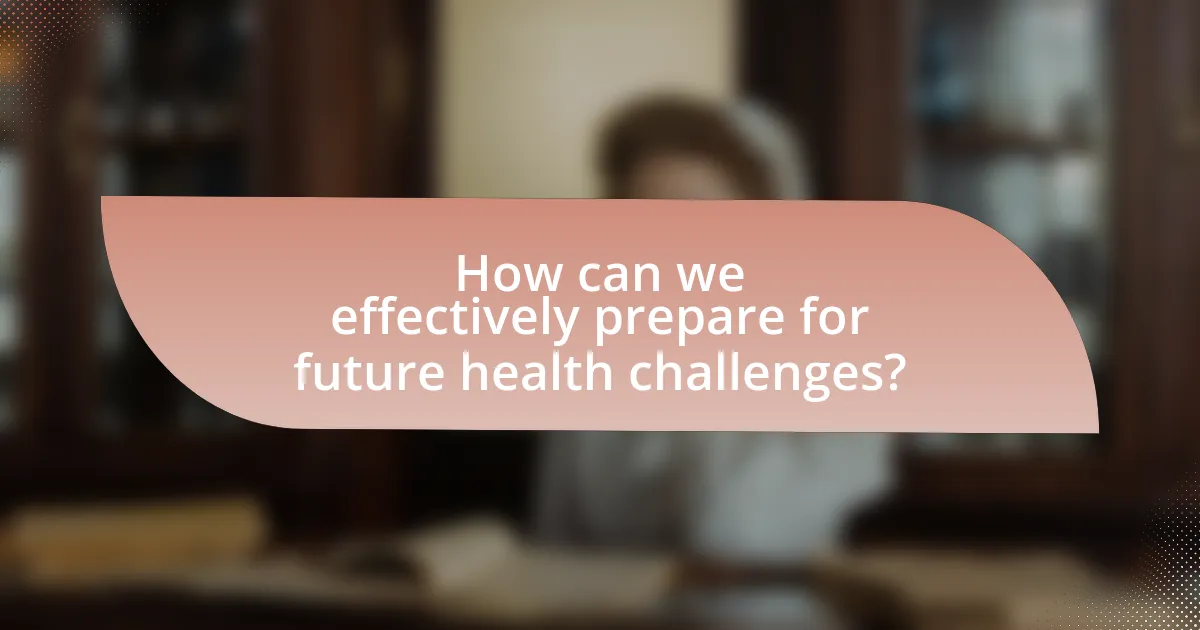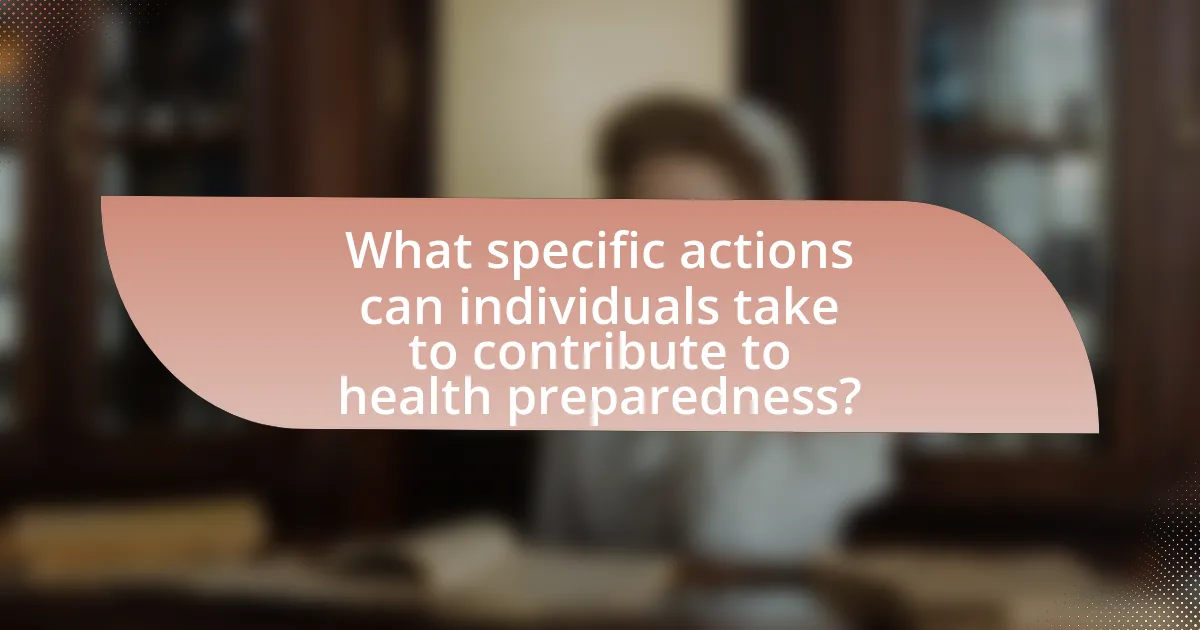The article focuses on the critical health challenges that have emerged in the aftermath of the COVID-19 pandemic, including increased mental health issues, long COVID symptoms, and the strain on healthcare systems. It highlights how the pandemic has reshaped public health understanding, emphasizing the importance of global preparedness, equitable healthcare access, and the need for robust health infrastructure. Key lessons learned from the pandemic are discussed, along with strategies for enhancing health system resilience, community engagement, and the role of technology in future health crises. The article also addresses emerging health threats and the significance of vaccination and preventive care in mitigating risks.

What are the key health challenges we face after COVID-19?
The key health challenges we face after COVID-19 include mental health issues, long COVID symptoms, and healthcare system strain. Mental health problems have surged, with studies indicating a significant increase in anxiety and depression rates, affecting approximately 30% of the population. Long COVID, characterized by persistent symptoms such as fatigue and cognitive dysfunction, impacts around 10-30% of those infected, leading to ongoing healthcare needs. Additionally, the pandemic has strained healthcare systems, resulting in delayed treatments for non-COVID conditions and increased pressure on healthcare workers, which can exacerbate existing health disparities.
How has COVID-19 reshaped our understanding of public health?
COVID-19 has reshaped our understanding of public health by highlighting the critical importance of global health systems and the interconnectedness of health security. The pandemic revealed vulnerabilities in public health infrastructure, emphasizing the need for robust surveillance systems, rapid response capabilities, and equitable access to healthcare resources. For instance, the World Health Organization reported that countries with strong public health systems were better able to manage the crisis, demonstrating that investment in public health is essential for effective pandemic preparedness. Additionally, COVID-19 underscored the significance of addressing social determinants of health, as disparities in health outcomes were evident among different populations, prompting a reevaluation of health equity as a fundamental component of public health strategy.
What lessons have we learned from the COVID-19 pandemic?
The COVID-19 pandemic has taught us the importance of global preparedness and rapid response to health crises. Effective communication and collaboration among countries and health organizations are crucial for managing pandemics, as evidenced by the World Health Organization’s role in coordinating responses and sharing information. Additionally, the pandemic highlighted the need for robust healthcare infrastructure and investment in public health systems, demonstrated by the strain on hospitals and healthcare workers during peak infection periods. Vaccination development and distribution showcased the significance of scientific innovation and public trust in health measures, as seen in the rapid rollout of vaccines that reduced transmission and severity of illness. Lastly, the pandemic underscored the necessity of addressing health disparities, as marginalized communities faced higher infection and mortality rates, emphasizing the need for equitable healthcare access.
How can we apply these lessons to future health crises?
We can apply the lessons learned from COVID-19 to future health crises by enhancing global collaboration, improving public health infrastructure, and prioritizing rapid response mechanisms. The COVID-19 pandemic highlighted the necessity for countries to work together, as seen in the development and distribution of vaccines through initiatives like COVAX, which aimed to ensure equitable access to vaccines worldwide. Strengthening public health systems, as evidenced by the increased funding and resources allocated to healthcare in many nations during the pandemic, is crucial for better preparedness. Additionally, establishing rapid response frameworks, such as the WHO’s Health Emergency Program, can facilitate quicker mobilization of resources and expertise in future outbreaks. These strategies are essential for mitigating the impact of future health emergencies.
What are the emerging health threats post-COVID-19?
Emerging health threats post-COVID-19 include increased mental health issues, the rise of long COVID, and the resurgence of vaccine-preventable diseases. Mental health problems have escalated due to pandemic-related stressors, with studies indicating a significant rise in anxiety and depression rates globally. Long COVID affects a substantial number of individuals, with estimates suggesting that 10-30% of COVID-19 survivors experience lingering symptoms, impacting their quality of life and healthcare systems. Additionally, vaccine hesitancy has led to a resurgence of diseases like measles and whooping cough, as seen in various regions where vaccination rates have dropped. These threats highlight the need for ongoing public health initiatives and mental health support to address the consequences of the pandemic.
How do mental health issues manifest in the aftermath of the pandemic?
Mental health issues manifest in the aftermath of the pandemic through increased anxiety, depression, and post-traumatic stress disorder (PTSD) among individuals. Research indicates that the prevalence of anxiety and depressive disorders has significantly risen, with a study published in JAMA Network Open reporting that 41% of adults in the U.S. experienced mental health challenges during the pandemic. Additionally, social isolation, economic uncertainty, and grief from loss have exacerbated these conditions, leading to a surge in demand for mental health services. The World Health Organization has also highlighted that the pandemic has led to a deterioration in mental health globally, emphasizing the need for targeted interventions to address these emerging issues.
What infectious diseases are we at risk of facing in the future?
We are at risk of facing infectious diseases such as antibiotic-resistant bacteria, emerging viral infections like Nipah virus and Zika virus, and re-emerging diseases such as tuberculosis and measles in the future. The rise of antibiotic resistance is evidenced by the World Health Organization’s report indicating that at least 700,000 people die each year due to drug-resistant infections, a number that could rise to 10 million annually by 2050 if no action is taken. Additionally, climate change and increased human-animal interactions are contributing to the emergence of new viruses, as seen with the Nipah virus outbreaks in Bangladesh and India. The resurgence of diseases like tuberculosis is highlighted by the Global Tuberculosis Report, which noted that in 2020, there were an estimated 10 million cases worldwide, exacerbated by disruptions in healthcare services during the COVID-19 pandemic.
Why is preparedness crucial for future health challenges?
Preparedness is crucial for future health challenges because it enables effective response strategies that can mitigate the impact of health crises. Historical data from the COVID-19 pandemic illustrates that countries with robust preparedness plans, such as stockpiling medical supplies and establishing rapid response teams, experienced lower mortality rates and quicker recovery times. For instance, nations like South Korea and New Zealand implemented early testing and contact tracing, which significantly reduced virus transmission. This evidence underscores that proactive measures, including training healthcare professionals and investing in public health infrastructure, are essential for minimizing the effects of future health emergencies.
What strategies can enhance our health system’s resilience?
To enhance a health system’s resilience, implementing integrated care models is essential. Integrated care models facilitate collaboration among healthcare providers, ensuring that patients receive comprehensive and coordinated services. Research indicates that systems employing integrated care can reduce hospital readmissions by up to 20%, demonstrating improved patient outcomes and resource efficiency. Additionally, investing in robust health information technology systems allows for real-time data sharing and analytics, which can enhance decision-making and resource allocation during crises. Evidence from the World Health Organization shows that countries with advanced health information systems were better equipped to respond to the COVID-19 pandemic, highlighting the importance of technology in resilience. Furthermore, fostering community engagement and public health education strengthens the social fabric, enabling quicker responses to health emergencies. Studies have shown that communities with strong public health initiatives experienced lower morbidity rates during outbreaks. These strategies collectively contribute to a more resilient health system capable of effectively managing future health challenges.
How can community engagement improve health outcomes?
Community engagement can improve health outcomes by fostering collaboration between healthcare providers and the community, leading to tailored health interventions. Engaged communities are more likely to participate in health programs, share valuable local health data, and advocate for necessary resources, which enhances the effectiveness of public health initiatives. For instance, a study published in the American Journal of Public Health found that community-based participatory research significantly improved health outcomes in underserved populations by addressing specific local health needs and increasing access to care. This collaborative approach not only empowers individuals but also builds trust, ultimately resulting in better health literacy and healthier behaviors within the community.

How can we effectively prepare for future health challenges?
To effectively prepare for future health challenges, it is essential to enhance public health infrastructure and invest in research and development. Strengthening healthcare systems ensures rapid response capabilities during crises, as demonstrated by the COVID-19 pandemic, where countries with robust health systems managed outbreaks more effectively. Additionally, investing in vaccine research and distribution, as seen with the rapid development of COVID-19 vaccines, is crucial for combating future infectious diseases. Implementing comprehensive surveillance systems can also help in early detection of potential health threats, allowing for timely interventions.
What role does technology play in health preparedness?
Technology plays a crucial role in health preparedness by enhancing data collection, analysis, and communication during health crises. For instance, advanced data analytics and artificial intelligence enable health organizations to predict outbreaks and allocate resources effectively. During the COVID-19 pandemic, technologies such as contact tracing apps and telemedicine platforms facilitated timely responses and remote healthcare access, demonstrating their effectiveness in managing public health emergencies. Furthermore, the integration of electronic health records allows for real-time sharing of patient information, improving coordination among healthcare providers. These technological advancements are essential for building resilient health systems capable of responding to future health challenges.
How can telemedicine improve access to healthcare?
Telemedicine can improve access to healthcare by enabling patients to receive medical consultations remotely, thereby eliminating geographical barriers. This approach allows individuals in rural or underserved areas to connect with healthcare providers without the need for travel, which can be time-consuming and costly. According to a study published in the Journal of Medical Internet Research, telemedicine increased access to care for patients in remote locations by 50%, demonstrating its effectiveness in reaching populations that traditionally face challenges in accessing healthcare services.
What innovations in vaccine development are on the horizon?
Innovations in vaccine development on the horizon include mRNA technology advancements, nanoparticle vaccines, and universal vaccines targeting multiple strains of viruses. mRNA technology, which gained prominence during the COVID-19 pandemic, allows for rapid vaccine development and adaptability to emerging pathogens, as demonstrated by the Pfizer-BioNTech and Moderna vaccines. Nanoparticle vaccines, such as those being developed by companies like Novavax, enhance immune responses and stability, potentially leading to more effective vaccines with fewer side effects. Additionally, research into universal vaccines aims to create broad-spectrum solutions that can protect against various strains of influenza and coronaviruses, as evidenced by ongoing studies from institutions like the National Institutes of Health. These innovations are crucial for preparing for future health challenges, ensuring a more robust response to pandemics.
How can public health policies be strengthened?
Public health policies can be strengthened by enhancing data collection and analysis systems to inform decision-making. Improved data systems enable timely identification of health trends and outbreaks, facilitating targeted interventions. For instance, the COVID-19 pandemic highlighted the need for robust surveillance systems; countries with advanced data analytics, like South Korea, effectively managed outbreaks through rapid testing and contact tracing. Additionally, integrating community engagement in policy development ensures that health initiatives are culturally relevant and widely accepted, as evidenced by successful vaccination campaigns that involved local leaders in outreach efforts.
What are the key components of effective health policies?
Key components of effective health policies include clear objectives, evidence-based strategies, stakeholder engagement, and robust evaluation mechanisms. Clear objectives ensure that health policies address specific health issues and set measurable goals. Evidence-based strategies rely on data and research to inform decision-making, enhancing the likelihood of successful outcomes. Stakeholder engagement involves collaboration with healthcare providers, communities, and policymakers to ensure that diverse perspectives are considered, fostering greater acceptance and implementation of policies. Robust evaluation mechanisms allow for ongoing assessment of policy effectiveness, enabling adjustments based on real-world outcomes and emerging health challenges. These components collectively contribute to the resilience and adaptability of health systems, particularly in the context of preparing for future health challenges after COVID-19.
How can governments ensure equitable healthcare access?
Governments can ensure equitable healthcare access by implementing universal healthcare systems that provide comprehensive coverage to all citizens. Universal healthcare has been shown to reduce disparities in health outcomes; for instance, countries like Canada and the UK have demonstrated lower rates of preventable diseases and improved overall health metrics compared to systems with limited access. Additionally, governments can allocate resources to underserved communities, ensuring that healthcare facilities are accessible and that services are culturally competent. Evidence from the World Health Organization indicates that equitable access leads to better health outcomes and reduced healthcare costs in the long term.

What specific actions can individuals take to contribute to health preparedness?
Individuals can contribute to health preparedness by staying informed about health guidelines and participating in community health initiatives. By regularly following updates from health organizations, individuals can understand best practices for disease prevention and response. Engaging in local health programs, such as vaccination drives or health education workshops, enhances community resilience. Additionally, maintaining personal health through regular check-ups and vaccinations helps reduce the burden on healthcare systems during crises. Research indicates that communities with higher vaccination rates and health literacy are better equipped to handle health emergencies, as seen during the COVID-19 pandemic.
How can individuals stay informed about health issues?
Individuals can stay informed about health issues by regularly accessing credible sources of information such as government health websites, reputable medical organizations, and peer-reviewed journals. For instance, the Centers for Disease Control and Prevention (CDC) and the World Health Organization (WHO) provide up-to-date information on various health topics, including emerging diseases and public health guidelines. Engaging with health news from established media outlets and participating in community health programs also enhances awareness. Research indicates that individuals who utilize multiple reliable sources are better equipped to understand health risks and make informed decisions, as highlighted in studies published in the Journal of Health Communication.
What resources are available for reliable health information?
Reliable health information can be accessed through government health websites, academic institutions, and reputable medical organizations. For instance, the Centers for Disease Control and Prevention (CDC) and the World Health Organization (WHO) provide up-to-date information on various health topics, including disease prevention and health guidelines. Additionally, peer-reviewed journals such as The Lancet and the Journal of the American Medical Association (JAMA) publish research that is vetted by experts in the field, ensuring the accuracy and reliability of the information. These resources are essential for individuals seeking trustworthy health information, especially in the context of preparing for future health challenges after COVID-19.
How can community involvement enhance health literacy?
Community involvement enhances health literacy by fostering collaborative learning and resource sharing among individuals. When communities engage in health initiatives, they create environments where information is disseminated effectively, allowing members to access and understand health-related knowledge. For instance, programs like community health workshops have been shown to improve participants’ understanding of health issues, as evidenced by a study published in the Journal of Community Health, which found that community-led education increased health literacy scores by 30% among attendees. This collective effort not only empowers individuals with knowledge but also builds a supportive network that encourages healthy behaviors and informed decision-making.
What personal health practices can mitigate future risks?
Engaging in regular physical activity can mitigate future health risks. Exercise strengthens the cardiovascular system, improves immune function, and reduces the likelihood of chronic diseases such as obesity, diabetes, and heart disease. According to the World Health Organization, adults should engage in at least 150 minutes of moderate-intensity aerobic activity each week to maintain optimal health. Additionally, maintaining a balanced diet rich in fruits, vegetables, whole grains, and lean proteins supports overall health and reduces the risk of diet-related illnesses. Research published in the Journal of Nutrition indicates that proper nutrition can enhance immune response and decrease the incidence of infections. Furthermore, practicing stress management techniques, such as mindfulness and meditation, can lower cortisol levels and improve mental health, which is crucial for resilience against future health challenges.
How can vaccination and preventive care play a role?
Vaccination and preventive care are essential in mitigating the impact of infectious diseases and enhancing public health resilience. Vaccination reduces the incidence of diseases by stimulating the immune system to recognize and combat pathogens, evidenced by the significant decrease in diseases such as measles and polio due to widespread immunization programs. Preventive care, including regular health screenings and lifestyle interventions, helps identify health issues early and promotes overall well-being, which is crucial in managing potential health crises like those experienced during the COVID-19 pandemic. Studies show that countries with robust vaccination and preventive care strategies have lower hospitalization rates and better health outcomes during outbreaks, highlighting their critical role in preparing for future health challenges.
What lifestyle changes can support overall health resilience?
Adopting a balanced diet, engaging in regular physical activity, managing stress, ensuring adequate sleep, and fostering social connections can significantly support overall health resilience. A balanced diet rich in fruits, vegetables, whole grains, and lean proteins provides essential nutrients that bolster the immune system and overall health. Regular physical activity, such as 150 minutes of moderate exercise weekly, has been shown to improve cardiovascular health and reduce the risk of chronic diseases. Stress management techniques, including mindfulness and meditation, can lower cortisol levels and enhance mental well-being. Adequate sleep, typically 7-9 hours per night, is crucial for recovery and cognitive function. Lastly, maintaining strong social connections has been linked to improved mental health and longevity, as evidenced by studies showing that social support can mitigate the effects of stress and enhance resilience.
What are the best practices for community health initiatives?
The best practices for community health initiatives include engaging stakeholders, utilizing data-driven approaches, and fostering collaboration among community members. Engaging stakeholders ensures that the initiatives are relevant and tailored to the community’s needs, as evidenced by the success of programs that involve local leaders and organizations. Data-driven approaches, such as assessing health disparities and tracking outcomes, enable initiatives to be effective and measurable; for instance, the use of health surveys can identify specific health issues within a community. Collaboration among community members enhances resource sharing and support, which has been shown to improve health outcomes in various studies, including those conducted by the World Health Organization.


